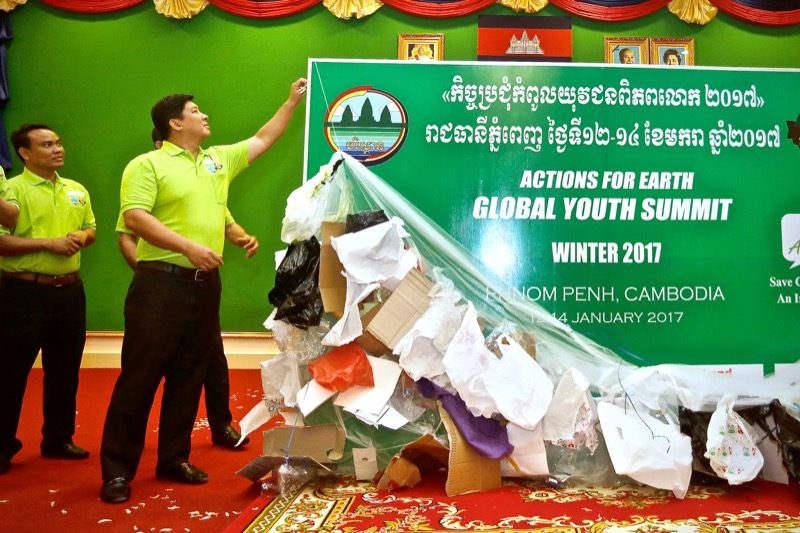Hailing from a port city in East Java, Indonesia, Namira Najma Kaestiah Putri Poesli, an eighth grader, said on her second day in Phnom Penh that she could sympathize with Cambodia’s trash problem.
In Surabaya, where she’s from, “a lot of people know that you have to put the trash in the bin. But they still throw it in the river, just because they’re lazy,” she said.

Behavior among people in Phnom Penh and her hometown were about the same, she said. “Actually, in Indonesia, it’s a little more dirty. But Indonesia is greener. I rarely see any trees on the streets [in Phnom Penh].”
Namira was among 200 students, aged 11 to 21, to come to Phnom Penh for the seventh Global Youth Summit, hosted by the Ministry of Environment. The event brings together young people from around the region to talk about trash management and present ideas for dealing with waste and wastefulness.
The person with the best idea will receive funding to turn it into a business, said Ann Phua, president of the Hemispheres Foundation, which supports the event. Past projects have included a hand-sanitizing gel made from lemongrass, and a device that cuts off electricity to a telephone left charging once the battery is full, she said.
Namira and others entering their ideas did not want to talk about them on Thursday, and asked reporters to wait and see their presentations. Awards will be presented on Saturday afternoon.
The most important aspect, Ms. Phua said, was “attitude change.”
“Some of us are more fortunate,” she said, addressing an audience of young people from Singapore, Australia, China, Vietnam, Cambodia and Indonesia. “We have waste collectors that come in the night and take the trash up. We wake up and see—the land is so clean!”
“This won’t last forever,” she said. “It would be better if we all together here extended the use of the things we have.”
Environment Minister Say Sam Al said the changing economies of Asean countries made trash a pressing problem. When he was young, he said, he had a plastic water bottle he would reuse, taking it to school every day.
“Our economies start to get better, and there’s a lot of plastic bottles we can have for very cheap,” he said. “It’s easy to go through two or three every day.”
Qunh Tram and Cao Cuong, both 17 and from Ho Chi Minh City, also noted that Vietnam’s stronger economy hadn’t translated into cleaner streets.
“I think about the garbage collection—it’s similar in Ho Chi Minh City,” Cao said.
“We went to the Russian market this morning—it’s a market, but there’s hardly any rubbish. In Ho Chi Minh City, it spills out onto the road.”
Frustrated with the state of his city, Cao has already founded an organization to fund environmental efforts by sellingworks of art he makes from trash.
“The young people want to do something,” he said. “But we don’t have a lot of funds.”




